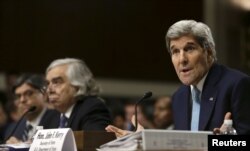U.S. Secretary of State John Kerry said Friday that if Congress disapproves of the Iranian nuclear deal, it will undermine President Barack Obama's ability to act throughout the world.
It would be a "repudiation of President Obama's initiative and a statement that when the executive department negotiates, it doesn't mean anything anymore because we have 535 Secretaries of State," Kerry said, referring to the number of members of the House and Senate.
Kerry defended the nuclear deal the U.S. and five other world powers negotiated with Iran at the Council on Foreign Relations in New York, saying that the deal struck last week in Vienna is the only alternative to military action and must be tested if diplomacy is to succeed.
In a reprise of his testimony Thursday before the Senate Foreign Relations Committee, Kerry said the agreement is the best way to prevent Iran from developing an atomic weapon.
If Congress rejects the deal, he said Iranian hardliners would speed ahead with their nuclear program and the international sanctions regime would collapse.
He said there is more chance of a nuclear arms race in the Middle East without the recently negotiated deal.
Meeting Jewish groups
Kerry appeared on NBC's Today show and was addressing the Council on Foreign Relations before meeting with the leaders of the American Jewish Committee and the Conference of Presidents of Major American Jewish Organizations.
Some Jewish groups have vehemently opposed the deal with Iran, which has pledged to destroy Israel.
Kerry has been front and center in the Obama administration's campaign to sell the deal to skeptical lawmakers.
Congress has started a 60-day review of the agreement, which lifts economic sanctions against Iran if it curbs its nuclear program's capacity to build a nuclear weapon.
Slowly, a number of congressional Democrats have begun lining up behind the deal.
Rep. Sam Farr, a Democrat, said he supports the agreement and described the upcoming vote in Congress as a "vote on something that will avoid war."
'What's your plan?'
At a Senate Foreign Relations Committee hearing on Thursday, Kerry said it is "fantasy, plain and simple" to claim President Barack Obama failed to insist on enough restraints on Iran's nuclear program before agreeing to lift economic sanctions long in place.
"So what's your plan? ... Totally go to war?" he challenged lawmakers who want to torpedo the deal.
"If the U.S., after laboriously negotiating this multilateral agreement with five other partners, were to walk away from those partners, we're on our own," Kerry said.
"Our partners will not walk away with us. Instead, they will walk away from the tough multilateral sanctions regime that they've helped to put in place, and we will have squandered the best chance we have to solve this problem through peaceful means," he said.
Skeptical
Republicans were unpersuaded.
"I believe that you have crossed a new threshold in U.S. foreign policy where now it is the policy of the United States to enable a state sponsor of terror to obtain an industrialized nuclear development program," said committee chairman Senator Bob Corker, a Republican.
Given the political calculus, the Senate hearing wasn't so much an attempt by Kerry to persuade Republicans to support the plan as it was an opportunity to reassure Democrats.
And after four days of reading and mulling the more than 150-page agreement, more Democrats are poised to publicly embrace it, according to a Democratic aide.
The aide spoke on condition of anonymity because he wasn't authorized to discuss lawmakers' decisions until they are formally announced.






